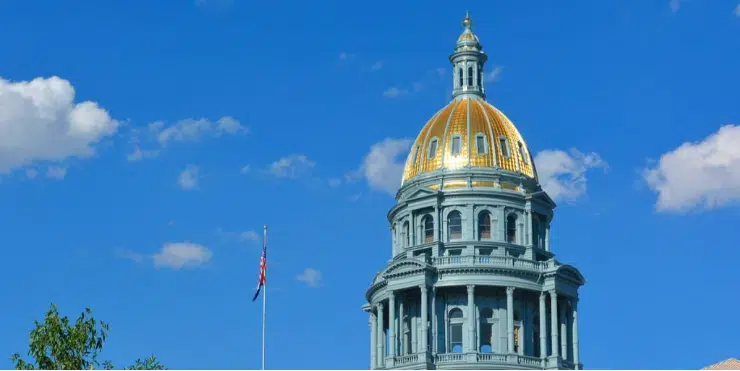
In 2020, a Colorado bill to reduce drug possession penalties will go into effect. According to HB 19-1263, the charge for possession of certain Schedule I or II substances will change from a felony to a misdemeanor. By effectively decriminalizing the use of many substances, fewer people in Colorado will find themselves in jail for drug-related charges. In addition, Colorado’s Joint Budget Committee estimates the state will save at least $8.6 million over the next five years in incarceration costs.
Why the Decriminalization of Drugs Is Being Considered
The main goal of this bill is to stop the “revolving door” of drug-related crime. Essentially, many people with substance use disorders leave jail and feel they have nowhere to turn to for help. If they return to using drugs, they are usually caught and sent back into the criminal justice system.
In 2018 alone, drug-related cases made up 34% of Colorado felonies. The bill will reduce pressure on prison systems and state officials, and the money saved can be diverted toward drug prevention and awareness. By reducing criminal charges, many people with addiction will no longer be charged with felonies that can make life in general much more difficult. Instead of being sent to jail, these people can receive a second chance and an opportunity for recovery.
What Decriminalization Means for Those Suffering from Addiction
Drug decriminalization signifies a shift in the understanding of drug addiction. Many people still view addiction as a choice instead of a mental health disorder, which creates stigma and prevents people with addiction from getting help. When the bill is enacted, people will have more chances to find treatment instead of being disregarded and given long jail sentences.
This Season, Give Yourself the Gift of a Fresh Start.
Whether you are struggling with addiction, mental health or both, our expert team is here to guide you every step of the way. Don’t wait— reach out today to take the first step toward taking control of your life.
Specifically, the bill changes the possession of certain drugs from felonies to level 1 drug misdemeanors:
- Possession of Schedule I or II drugs, including prescription opioids, heroin and methamphetamine, will be punished with 180 days in jail or two years probation. After the first two convictions, further convictions will have slightly higher punishments.
- People with less than two ounces of marijuana will not be arrested
- Those with more than six ounces will receive a level 1 drug misdemeanor
Decriminalization vs. Legalization
Decriminalization and legalization are not the same things. Decriminalization simply reduces the penalties of drug possession, while legalization makes drug use and possession legal.
For example, Denver residents recently voted to decriminalize the use and possession of “magic mushrooms.” The substance is still illegal, but the city will now use fewer resources to prosecute people for using hallucinogenic mushrooms. In contrast, Colorado legalized marijuana statewide, but residents can still receive fines or charges for possessing more than 1 ounce of the drug. Though legal, marijuana use is also governed under similar guidelines to alcohol use.
Pros and Cons of Reduced Sentencing for Drug-Related Crimes
Decriminalization reduces the number of people incarcerated for drugs. By extension, this reduces the costs for law enforcement agencies and judicial systems which will see fewer drug-related cases. In addition, the prison system won’t have to house as many people. People with an addiction will not have the same life-changing consequences they experienced before, and they may be better able to seek treatment if they are not imprisoned.
People who are against decriminalization bring up a few contrary points. Many are concerned that decriminalization may entice more people to try substances for the first time. These people could become addicted, placing an increased burden on the health care system. Others may begin committing crimes to fuel their addiction, which offsets the number of people who aren’t in jail for drug possession.
There are a number of states that have decriminalized weed, and marijuana is legalized in Colorado. Studies show that youth marijuana use has not increased, and DUIs have decreased by 15% from 2014 to 2017. Serious marijuana-related crimes have stayed around the same as before legalization, but organized crime cases have increased.
In 2001, Portugal decriminalized all illicit drugs. Many believed this would destroy the country, but the results show that Portugal has seen little difference in the number of drug users. In fact, many drug-related issues have improved since the policy was enacted. Law enforcement has been able to focus on more important criminal issues, and the country has shifted its view of drug use from a criminal activity toward a mental health concern.
Treating Addiction as a Health Problem, Not a Criminal Problem
Portugal and other countries have begun approaching addiction as a disease instead of as a criminal issue. The disease model of addiction illustrates how drug use causes changes to the brain, and many people have disorders or behaviors that predispose them to drug use and addiction. It is incredibly difficult for people to stop using substances on their own, and sending people to jail does not treat the underlying causes of addiction. As a disease, treatment for drug addiction generally is not a cure, but addiction is treatable and it can be successfully managed.
By decriminalizing drugs, people with addiction may have a better opportunity to seek and receive treatment. In addition, the stigma surrounding addiction can be reduced, and people will be more willing to perceive addiction as an ailment instead of a choice.
If you or someone you love is suffering from an addiction, The Recovery Village at Palmer Lake can help. Contact us today to learn more about treatment options and programs that can work well for you.







